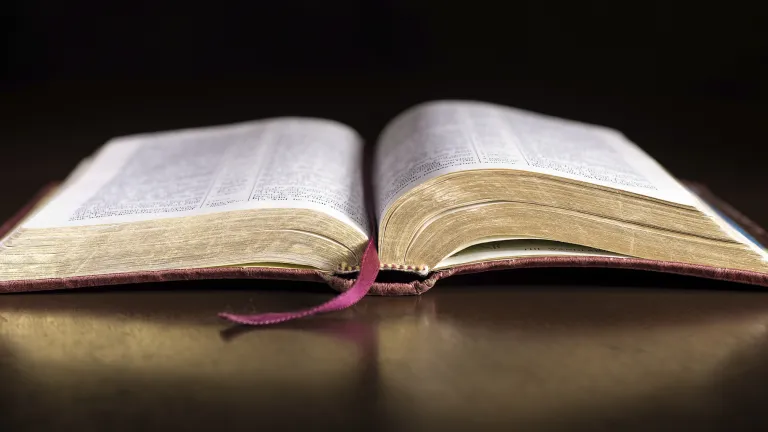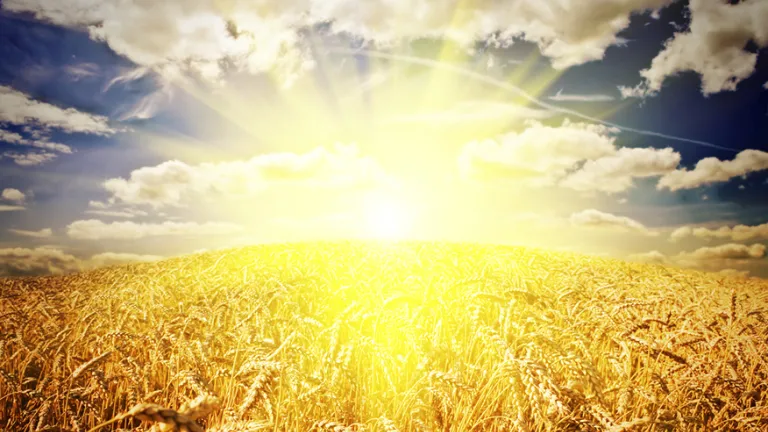How God's Festivals Teach Us About Jesus Christ

The feasts of the Lord, which you shall proclaim to be holy convocations, these are My feasts" (Leviticus 23:2). Here God Almighty says in Scripture that these are His feasts. Why are they important to Him? And why should they be important to every Christian?
The answer is simple but profound: They center around and teach us about God's plan for all mankind and the centrality of Jesus Christ's role in every step toward its completion. Yet for most of traditional Christianity, these biblical feasts are thought to have been kept only by the Jews and are considered meaningless for Christians.
Their meaning in this regard has sadly escaped most Bible readers for the last 2,000 years. Let's take another brief look at each of these festivals and see what they teach us about the Savior of mankind, Jesus Christ, and how He accomplishes God's incredible plan for humanity.
The Passover: God's plan begins with Christ's redeeming sacrifice
As noted earlier, the Passover is the first of God's annual feast days mentioned in Scripture. It commemorates the greatest event in the people of Israel's history—their miraculous redemption from Egypt. But is this feast only to celebrate the Israelites being spared when God brought judgment on the Egyptians? What do we learn from later Scripture about this festival?
When John the Baptist saw Jesus Christ coming to the Jordan River to be baptized, he exclaimed, "Behold! The Lamb of God who takes away the sin of the world!" (John 1:29). In the Bible the lamb is a symbol of the Passover because a lamb was slain at the beginning of the Passover and eaten that night. The Israelites knew the blood of the lamb had protected them from the death of their firstborn on that first Passover night they kept in Egypt (Exodus 12:12-13).
On the night before His death, Jesus knew He was fulfilling the symbolism of the Passover lamb in voluntarily giving His life for the sins of the entire world so that others might be spared from death. He then instituted the symbols that represented not the sacrifice of a lamb, but His far greater sacrifice. The Passover symbols would now represent Christ's complete sacrifice—the unleavened bread representing His sinless body that was beaten for us, and the wine signifying the blood He would shed to cleanse us from our sins.
From then on, this feast took on a much greater new meaning to the Church. Instead of being abolished, this feast now revealed its true, ultimate meaning. The disciples now realized the Passover lamb was only the physical forerunner of that perfect sacrifice which was Jesus Christ. Now they would keep this feast with far greater significance and comprehension.
Some 25 years after Christ's death, the apostle Paul instructed the Corinthian congregation—composed of believing Jews and gentiles alike—about the Passover: "Therefore purge out the old leaven, that you may be a new lump, since you truly are unleavened. For indeed Christ, our Passover, was sacrificed for us" (1 Corinthians 5:7).
Paul understood this ancient feast of the Passover had now revealed its true meaning with Christ's sacrifice. It was part of God's plan for all of mankind that Jesus would come and give His life in sacrifice for the sins of the world—and all the Passover lambs slain for almost 15 centuries before represented that greatest of all sacrifices.
So, far from being obsolete, the Passover was revealed to have a vastly important meaning for Christians, with Jesus Christ being at its center.
The apostle Paul clearly understood that the biblical feasts represented or modeled what was to come in God's master plan of salvation. In a passage frequently misunderstood by many, Paul shows that these feasts were "a shadow of things to come"—not just a memorial of things that have already happened (Colossians 2:16-18).
After all, when you see a shadow approaching, it indicates something coming, not something already passed. So Paul mentions how important these festivals of God are, as foreshadowing coming events in His plan for mankind. These events have not been completely accomplished so far, and their significance for the vast majority of mankind lies still in the future.
The Days of Unleavened Bread: Christ's role in the life of a Christian
What about the Days of Unleavened Bread? Are they obsolete, or do they also teach a magnificent lesson about Jesus Christ as Savior of mankind?
Prior to Jesus Christ's coming, the Days of Unleavened Bread were understood to be a memorial of what occurred with the Israelites after the Passover night when all the Egyptian firstborn died. The next morning the Israelites loaded up their belongings and traveled to a nearby gathering place, ready for departure. That evening, they left Egypt by night.
Before that evening, one last thing occurred: "And they baked unleavened cakes of the dough which they had brought out of Egypt; for it was not leavened, because they were driven out of Egypt and could not wait, nor had they prepared provisions for themselves" (Exodus 12:39).
We find this feast clearly spelled out in Leviticus 23:6: "And on the fifteenth day of the same month [as Passover] is the Feast of Unleavened Bread to the Lord; seven days you must eat unleavened bread."
What does this feast have to do with Christ? What does it teach us?
In writing to the church congregation in Corinth, the apostle Paul explains the spiritual symbolism of unleavened bread. Rebuking the Church members there for their acceptance of sin, he tells them: "Your glorying is not good. Do you not know that a little leaven leavens the whole lump? Therefore purge out the old leaven, that you may be a new lump, since you truly are unleavened. For indeed Christ, our Passover, was sacrificed for us" (1 Corinthians 5:6-7).
Yes, as Paul states, it is the sacrifice of Jesus Christ that removes our sins, and so we become "unleavened" in a spiritual sense. Further, God commanded that unleavened bread is to be eaten throughout this seven-day Feast. As discussed earlier, eating unleavened bread represents taking in Jesus Christ and making Him a part of our lives.
As He explained in John 6, He is "the true bread from heaven," "the bread of God" and "the bread of life." He is the divine bread that God supplies to satisfy the spiritual hunger and fill the spiritual vacuum in every person. Jesus further explained: "He who comes to Me shall never hunger, and he who believes in Me shall never thirst . . . I am the living bread which came down from heaven. If anyone eats of this bread, he will live forever" (John 6:35, John 6:51).
So, again, Jesus Christ is the focus of this feast too. The shadow of this feast points to what Jesus would do for all of us in cleansing us of sin and helping us to live sin-free lives—which we do by partaking of Him daily and allowing Him to live again within us (Galatians 2:20).
Paul told the Corinthian brethren that they should continue to keep this feast that followed the Passover: "Therefore let us keep the feast, not with old leaven, nor with the leaven of malice and wickedness, but with the unleavened bread of sincerity and truth" (1 Corinthians 5:8).
We see, then, that the spiritual meaning of the Days of Unleavened Bread was revealed. Its deeper significance wasn't ultimately found in what had occurred in the Old Testament, but in Jesus Christ, the sinless Savior who purged our sins and allows us to be spiritually "unleavened" before God.
We should also note that Jesus was buried for the first three days of this festival and then raised to life again in the midst of it. This points to our need to have our old self figuratively buried with Him and then rising with Him into newness of life, as baptism pictures (Romans 6:1-14). Only in this way can we truly come out of sin and into Christ's way of righteousness.
Pentecost: the founding of His Church and living in us through the Holy Spirit
As noted earlier, the Feast of Pentecost is called the Feast of Weeks in Exodus 34:22. This is because Leviticus 23:15-16 mentions counting seven weeks (or Sabbaths) or "fifty days" from the day the wave sheaf was offered during the Days of Unleavened Bread. Thus the feast acquired the name of "fiftieth," which is what Pentecost means in the Greek language of the New Testament.
Fifty days after Jesus Christ had been resurrected, the first Christians were celebrating Pentecost, one of the biblical feasts of God. And, as recorded in Acts 2, what a day that was! On it they received the Holy Spirit in a powerful and dramatic way. Suddenly the Feast of Weeks had taken on a new meaning. The shadow of this feast had now become a reality! Pentecost would become the day on which Jesus Christ would found the Church that He had promised earlier He would build (Matthew 16:18).
Jesus Christ revealed the significance of this feast by sending the Holy Spirit to His brethren in the faith. He had also told them, "Behold, I send the Promise of My Father upon you; but tarry in the city of Jerusalem until you are endued with power from on high" (Luke 24:49).
God's Spirit plays a crucial role in the life of Christians today as it did then. When a person receives God's Spirit upon repentance and baptism, that Spirit begins a process of spiritual transformation in the person's life, a transformation the Bible calls conversion (to learn more, read the Bible study aid booklet Transforming Your Life: The Process of Conversion).
Through this process, we shed our own way of thinking and living and allow Jesus Christ's attitude and way of life to guide everything we do. Paul described this life-transforming change in Galatians 2:20: "I am crucified with Christ: nevertheless I live; yet not I, but Christ liveth in me: and the life which I now live in the flesh I live by the faith of the Son of God, who loved me, and gave himself for me" (KJV). Indeed, it is through the Holy Spirit that Jesus Christ comes to live within the believer.
Thus we see that Jesus is at the center of the Feast of Pentecost as well. Yet the ultimate fulfillment will only be realized after He returns to earth to establish God's Kingdom, when all will have access to God's Spirit.
So this feast should still be kept as a shadow of what is yet to come until its purpose is completely accomplished.
The Feast of Trumpets: Jesus Christ's glorious return
The next of God's sacred feasts is the Feast of Trumpets. It is "a holy convocation commemorated with trumpet blasts" (Leviticus 23:24, NRSV). God said that when trumpets were blown, "you will be remembered before the Lord your God, and you will be saved from your enemies" (Numbers 10:9).
What does this feast teach us about Jesus Christ's role in things to come?
Jesus Himself refers to the symbolism of the trumpet in describing the circumstances of His return to earth—His second coming: "Then the sign of the Son of Man will appear in heaven, and then all the tribes of the earth will mourn, and they will see the Son of Man coming on the clouds of heaven with power and great glory. And He will send His angels with a great sound of a trumpet, and they will gather together His elect from the four winds, from one end of heaven to the other" (Matthew 24:30-31).
In the writings of the New Testament we often find trumpets tied to Christ's coming. Notice again Paul's description of the resurrection of the dead at the time a great trumpet announces Christ's return in 1 Thessalonians 4:16: "For the Lord Himself will descend from heaven with a shout, with the voice of an archangel, and with the trumpet of God. And the dead in Christ will rise first." And Jesus Himself will resurrect His followers (John 6:44).
So Christ will ultimately fulfill the symbolism behind the Feast of Trumpets. He is the center of this foreshadowing feast too. At His second coming, the trumpet shall sound, announcing the triumphant arrival of the King of Kings! As we've seen, loud voices proclaim, "The kingdom of the world has become the kingdom of our Lord and of his Christ, and he shall reign forever and ever" (Revelation 11:15, ESV).
But until the sound of the trumpet is heard, this feast is still pointing to the future, and its meaning is still to be fulfilled—with Jesus at its center.
The Day of Atonement: mankind reconciled to God through Christ
Perhaps the most unusual of the biblical feasts is the Day of Atonement. It included an elaborate ritual described in Leviticus 16. The high priest was to present two male goats, the first of which was sacrificed for the nation's sins (Leviticus 16:15). Then, after the sins of the nation were symbolically placed on the other goat, it was expelled into the desert (Leviticus 16:21-22).
What does the Day of Atonement reveal about Jesus Christ's roles? Is He also at the center of this feast?
We read in Hebrews 13 about the Day of Atonement, and Christ being symbolic of the male goat and other animals slain on that day as sin offerings. "For the bodies of those animals, whose blood is brought into the sanctuary by the high priest for sin, are burned outside the camp. Therefore Jesus also, that He might sanctify the people with His own blood, suffered outside the gate [of the city of Jerusalem]" (Hebrews 13:11-12).
Not only does the Day of Atonement depict Christ's sacrifice for sin and a true spiritual reconciling of the people with God, but Christ is also our High Priest who took His own blood into the Most Holy Place of heaven and by His blood has purified and sanctified us. And as our High Priest, Jesus intercedes for us with the Father—as He will for a repentant humanity in the future.
Further, Jesus is directly involved in the symbolism of the other male goat that was cast out into the desert by a strong man (Leviticus 16:21). The second goat, over which the sins of the Israelites were confessed by the high priest, represented the instigator of those sins—none other than Satan the devil. At Christ's second coming, He will command a powerful angel to bind Satan and cast him into a place of restraint for 1,000 years, exiling him from mankind just as the live goat was exiled from the Israelite camp on the Day of Atonement.
As John wrote: "Then I saw an angel coming down from heaven, having the key to the bottomless pit and a great chain in his hand. He laid hold of the dragon, that serpent of old, who is the Devil and Satan, and bound him for a thousand years" (Revelation 20:1-2).
So Christ plays multiple roles in the symbolism of the Day of Atonement. He is sacrificed as the first goat for the sins of the people, the atonement of which is yet to be applied to all mankind after His return. He is the interceding High Priest. And He will also be involved, as King of Kings, in banishing Satan to establish the Kingdom of God on earth.
The Feast of Tabernacles: Jesus Christ reigns over the entire earth
Next follows the sixth biblical feast, the Feast of Tabernacles. It was originally kept by the Israelites to remind them of all God's miraculous interventions during the 40-year period in the wilderness: "All who are native Israelites shall dwell in booths, that your generations may know that I made the children of Israel dwell in booths when I brought them out of the land of Egypt" (Leviticus 23:42-43).
But what does the Feast of Tabernacles have to do with Jesus Christ? Describing Christ's earthly ministry, the apostle John states that "the Word became flesh and dwelt among us" (John 1:14). The Greek term translated "dwelt" here literally means that He "tabernacled" among us. Just as Jesus Christ as the Creator God of the Old Testament (John 1:1-3, John 1:10; Hebrews 1:2; Colossians 1:16) "tabernacled" with the Israelites in the wilderness, He now did so with His people in His physical life many centuries later.
The apostle Paul says that the Israelites in the wilderness all "drank the same spiritual drink; for they drank from the spiritual rock that accompanied them, and that rock was Christ" (1 Corinthians 10:4, NIV).
At Christ's second coming, He will again "tabernacle" with those who are saved. He will dwell with His people for a thousand years, and this 1,000-year rule of Jesus Christ over the earth is the ultimate fulfillment of this feast. "Blessed and holy is he who has part in the first resurrection. Over such the second death has no power, but they shall be priests of God and of Christ, and shall reign with Him a thousand years" (Revelation 20:6).
So Christ is definitely at the center of this feast too—as the ruler who "tabernacles," or dwells with, His people as He reigns on earth in the Kingdom of God for a thousand years.
The Eighth Day: the last judgment
The Feast of Tabernacles lasts seven days. Then, on the eighth day, there follows another, separate feast day, the last of the biblical feasts (Leviticus 23:36). What does this day have to do with Jesus Christ?
During Christ's 1,000-year reign, all of mankind will be offered God's Spirit. And beyond that, the Bible reveals there will come a future time when Christ will offer it to those who rise up in a resurrection of the dead from all past ages. In Revelation 20, we read what happens after the Millennium (pictured by the Feast of Tabernacles) is completed:
"Then I saw a great white throne and Him who sat on it, from whose face the earth and the heaven fled away . . . And I saw the dead, small and great, standing before God, and books were opened. And another book was opened, which is the Book of Life. And the dead were judged according to their works, by the things which were written in the books" (Revelation 20:11-12).
This period is also called the White Throne Judgment, and it is Jesus Christ who has been appointed to judge all of mankind (John 5:26-27; Romans 14:10). This does not mean immediate condemnation but an evaluation period, since the Book of Life is opened—meaning an opportunity is opened to receive God's Spirit and have one's name written into it. The apostle Paul writes in Philippians 4:3 of those "who labored with me in the gospel . . . and the rest of my fellow workers, whose names are in the Book of Life."
So Christ will also carry out the central role of this final feast, that of lovingly and mercifully offering the multitudes of the uninformed and the deceived an opportunity for conversion and salvation and then rewarding them according to the life they live.
Thus, the seven annual feasts of God are "a shadow of things to come," and Jesus Christ is at the center of all of them. Yet He has not brought them to ultimate fulfillment; that will only occur in the coming Kingdom of God.
Yes, Christ is our Passover who redeems us. He is the unleavened bread that purifies us and the One who leads us out of sin. He sent the Holy Spirit at Pentecost, through which He lives in us. He is the coming King heralded by the blast of the trumpets. He is the One who will banish Satan and intercede for mankind as High Priest. He will tabernacle with human beings on earth as King of Kings. And finally, He is to judge mankind and offer the great majority an opportunity to have their names written in the Book of Life.
This is why God's Church kept these feasts as shown in the New Testament (see God's Festivals in the New Testament). This is why these holy feasts are still to be kept—to remind us of the central role Jesus Christ has in carrying out the plan of God the Father. Isn't it about time you honored Him and started keeping them yourself?






